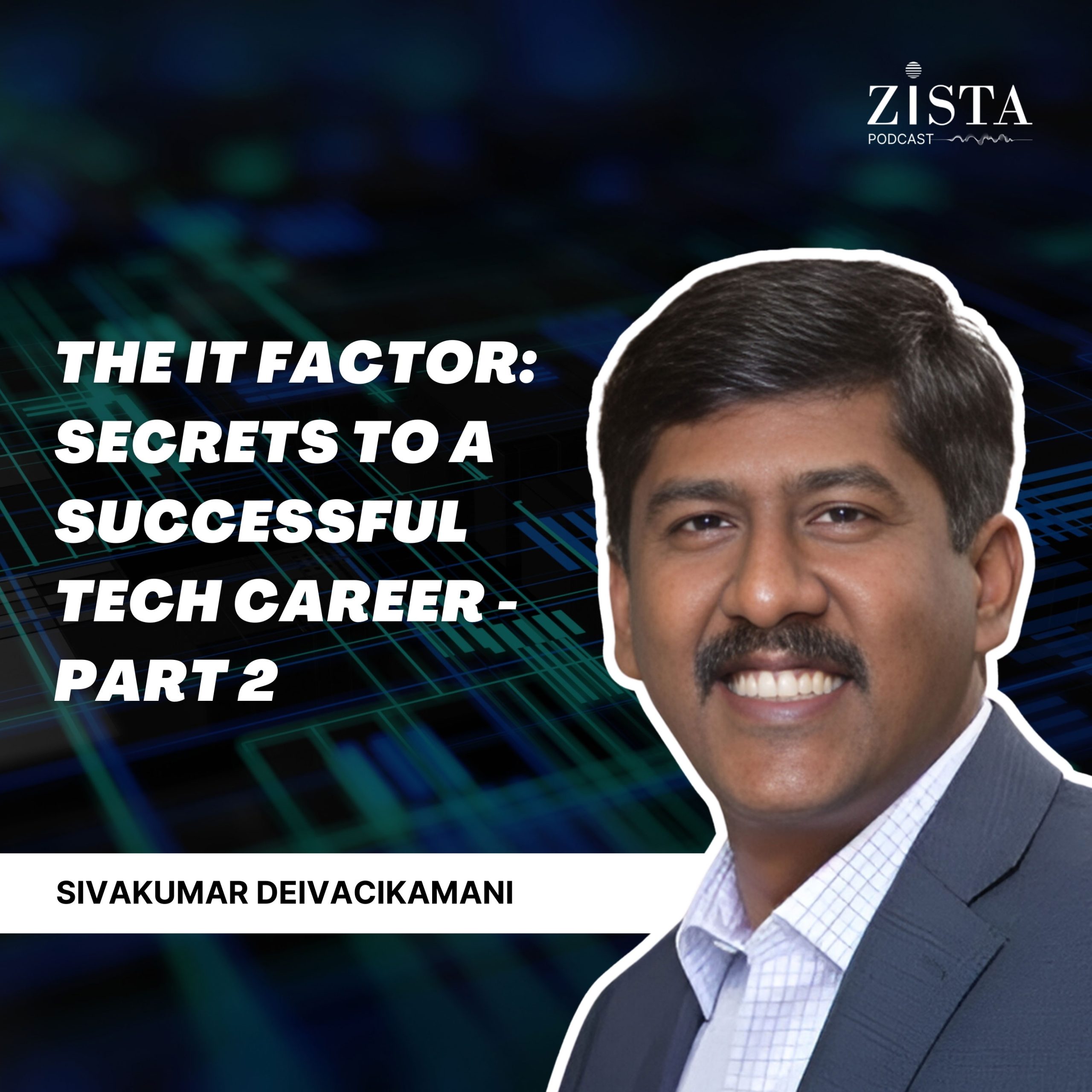Level-up your skillset: Succeed in today’s fast paced world
Welcome to The Zista Podcast, your go-to source for navigating the professional landscape. In today’s episode, we’re cutting through the noise to bring you clarity on accelerating your career in a fast-moving world.
We’re joined by Dhaval Thanki, a seasoned expert with an 18-year track record in tech and analytics, who currently leads as the Executive Vice President at Loginext. Dhaval is here to distill his extensive experience into actionable insights, helping you level up your skill set for today’s competitive job market.
Tune in as we tackle the essential skills that make the difference and offer a strategic perspective for students at the precipice of their career decisions. It’s time to empower your professional journey with wisdom from the top – right here, on The Zista Podcast.
Welcome back to another episode of The Zista Podcast, where we delve into the dynamics of professional growth and how to thrive in an ever-accelerating world.
In today’s episode, we’re zooming in on the crux of career evolution – upgrading your skill set. It’s no secret that the professional landscape is shifting faster than ever before. With technology advancing at breakneck speeds and industries transforming overnight, what does it take to not just keep up but truly stand out?
Joining us again is someone who knows a thing or two about staying ahead of the curve: Dhaval Thanki. With a rich background spanning 18 years in the high-stakes realms of tech, digital SAAS, and analytics, Dhaval’s expertise has been a cornerstone for growth in various startups. At the helm of Loginext as Executive Vice President, he brings a wealth of knowledge and proven strat that complement it,egies to our discussion.
Today, Dhaval will share his perspectives on the essential skills that can set you apart in this fast-paced world. From technical know-how to the soft skills we’re covering all the bases to help you navigate the complexities of today’s job market.
Prepare to absorb Dhaval’s rich insights on advancing your journey. This episode is more than just a conversation; it’s a gateway to unlocking the potential that will propel you to new heights in your career. So, let’s dive in and set the stage for success in this fast-paced world.
KEY TAKEAWAYS
- Developing strong communication skills is vital, as it enables individuals to convey ideas, inspire change, and collaborate efficiently both in personal and professional spheres.
- Staying open to new experiences, ideas, and ways of thinking is critical. It facilitates adaptability and fosters the agility needed to navigate an ever-changing world.
- The concept of lifelong learning is increasingly relevant. Continuously acquiring new skills can ensure relevance in a fast-paced environment and broaden career prospects.
- Aligning work with personal interests can transform routine tasks into enjoyable activities and fuel perseverance, which is essential for long-term success.
- Recognizing that career and personal life are intertwined can lead to a more balanced, fulfilling approach to both, reducing burnout and increasing overall happiness.
Q1: What are the key skills necessary for success in today’s rapidly changing environment?
A: Dhaval points out that as times change, so do the essential skills we need to succeed. It’s not enough to be proficient in isolated skills; we must continuously develop in all areas, especially those critical for our personal and professional evolution.
The first crucial skill Dhaval highlights is the ability to communicate effectively. Historically and today, communication has been a cornerstone of human success. It’s not our strength or intelligence alone that positions us at the apex of the food chain but our unparalleled ability to convey complex ideas and work together. This skill has the power to change beliefs, motivate others, and create a substantial impact across various areas, from commercial endeavors to personal relationships. Effective communication is so fundamental that a scientist with a groundbreaking idea, who lacks this skill, might struggle to secure funding or garner support. Thus, improving communication is paramount to ensuring that your other talents do not go unnoticed.
The second key skill is maintaining an open mind. Our interactions with the world shape our biases, often subconsciously, which can limit what we achieve. The ability to adapt is echoed in Darwin’s survival theory—not the strongest or the smartest survive, but the most adaptable. This adaptability is a necessity not just for individuals but also for organizations, as the environment and opportunities continuously evolve. Adapting may mean upskilling, changing your mindset, or reevaluating your belief system. In a world where change is the only constant, long-term planning becomes less feasible, as noted by Edward De Bono. Organizations and individuals must have a vision yet remain agile enough to pivot as new technologies and ideas emerge.
Lastly, Dhaval emphasizes the importance of stepping out of our comfort zones. While some may resist using new technologies like computers or phones, choosing to engage with them consciously—knowing when and how to use them—is more beneficial than avoiding them due to unfamiliarity. This decision-making allows us to control the impact of change on our lives. Adapting doesn’t mean abandoning one’s principles; rather, it’s about making informed choices to grow and evolve with the times.
In conclusion, success in today’s world relies heavily on our ability to communicate clearly and our willingness to remain open-minded and adaptable to change. These skills, coupled with the conscious decision to embrace new knowledge and experiences, will ensure that we are not just surviving but thriving in our ever-changing environment.
Q2: How can students adopt a holistic perspective when making career choices?
A: Dhaval emphasizes the concept of “Ikigai,” a Japanese term meaning “reason for being,” which is thoroughly explored in a book of the same title. Ikigai advocates finding the intersection of four key areas: what you love, what you are good at, what you can be paid for, and what the world needs. This intersection is the sweet spot for career satisfaction and success.
However, identifying your Ikigai can be challenging, especially for students who are still exploring their passions and abilities. Dhaval suggests that this exploration requires time, self-inquiry, and introspection. He encourages students to discuss with parents, mentors, and peers to better understand their own strengths and interests. This process is not about immediate clarity but rather a journey of discovery.
Moreover, Dhaval advises students to enjoy the process of their current engagements, whether or not they have found their passion. Finding joy in what you do currently can be a stepping stone to achieving greater satisfaction. He further highlights the importance of being present in the moment, asserting that life is an ongoing experience without a fixed destination. The focus should be on the journey, immersing fully in the present and leveraging every opportunity that comes your way.
Students are encouraged to work hard and persist in their chosen paths. The idea is to find a career so aligned with their interests that it doesn’t feel like work, similar to how legendary cricketer Sachin Tendulkar feels about playing cricket. This level of engagement can transform everyday work into something as enjoyable as a holiday.
In conclusion, Dhaval’s advice for students is to invest time and effort into finding their Ikigai while being open to the idea that work and life are not separate entities but intertwined. Success in any field, whether financial, emotional, or spiritual, follows naturally when one achieves this level of clarity and fulfillment. Therefore, students should aim to find what they are deeply passionate about, commit to it wholeheartedly, and enjoy the process of reaching the zenith of their personal and professional lives.




